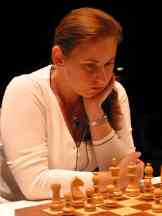Fembio Specials European Jewish Women Judit Polgár
Fembio Special: European Jewish Women
Judit Polgár

Biography
If Judit had attended school, she would have had to copy down what the teachers wrote on the blackboard and then memorize it at home. Judit's father, Laszlo Polgár, wanted to spare his three daughters the method of rote learning: he chose homeschooling in order to ensure that they learned as much as possible during childhood and adolescence. He successfully fought the school authorities for permission for the parents – both teachers – to teach Judit and her two sisters at home. In addition to acquiring basic knowledge and starting at the age of 5, all three girls learned to play chess – a game where players develop the mental and social skills such as analytical thinking, self-discipline, and good judgement that are necessary in order to achieve exceptional results. The girls read, did sports, listened to music, met up with friends – and they played chess for six to eight hours a day. Given such a questionable workload, their father faced criticism. But the positive response of his daughters to the taxing learning plan confirmed his thesis that “geniuses are made, not born”: all three daughters excel at chess.
At the age of twelve, Judit achieved the best result in the Women’s section of the Chess Olympiad in Thessaloniki with 12.5 points from 13 games; three years later, she became Hungarian national champion. At the age of 17, she defeated former world champion Boris Spassky and appeared in the world rankings for the first time: immediately placing 24th! Today, she is the best woman chess player in the world. She is intent on winning the World Championship and therefore participates almost exclusively in men's tournaments, which has both broken a taboo and resulted in the inevitable disparaging comments: “She has fantastic chess talent, but she remains a woman. It's all down to the imperfections of the female psyche. No woman can endure a long battle. She is fighting against centuries of habit…” (Kasparov, 1990). This statement, which was annoying enough at the time, seems downright embarrassing today – thanks to the women's movement and Judit! She beat Kasparov in September 2002.
It was often predicted that her career would come to an end when she started a family. In 2004, she did indeed take a break to have a baby and did not take part in any tournaments. But five months after the birth of her son Oliver on August 10, she increased her Elo rating by five points to 2728 at the tournament in Wijk aan Zee and placed ninth in the overall world rankings. In April 2006, she was ranked 14th with 2711 points.
(Text from 2006; translated with DeepL.com; edited by Ramona Fararo, 2025.
Please consult the German version for additional information, pictures, sources, videos, and bibliography.)
Author: Mechthild Winkler-Jordan
If you hold the rights to one or more of the images on this page and object to its/their appearance here, please contact Fembio.


